By Martín Barrón Trujillo*
On Friday, July 16th, the “Forum on the Modification of Article 68 of the General Law of Fisheries” was held in an effort to find a balance between commercial and sport fishing interests. The modification of the law deals with the possibility of opening comercial fishing of Mahi-Mahi (Dorado) to artisanal fishermen.
Councilman José Luis Marcos León Perea, hoping to reach an inclusive decision, coordinated the event that attracted representatives from the tourism, fisheries, and science sectors, as well as local and federal authorities.
Representatives from each sector were able to present their positions about the species and these were debated in the meeting of the Fisheries Commission.
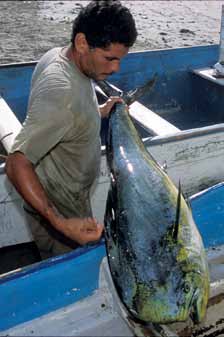 The prized fish can be found in many fishmarkets as well as on the menus of many restaurants.
The prized fish can be found in many fishmarkets as well as on the menus of many restaurants.
(Photo: Ernesto Bolado Martínez)
The tourist sector defended the position that for each Mahi-Mahi caught, $2,000 is generated for the economy.
The artisanal fishermen, with help from other presentations, argued that there are enough Mahi-Mahi for everybody, and that it is unfair that only a few benefit from their capture.
The scientific sector cited statistics and hard data in defending their proposals for reaching sustainability, and for reducing environmental impacts.
Thanks to the differing points of view presented at the forum, diverse conclusions about the capture of Mahi-Mahi were generated and it is hoped that the results released by the Fisheries Comission will reflect all of the opinions presented and that the decision made will benefit all sectors involved.
* Student, Institute for Marine
Tecnology
(ITMAR )
By Alex Daniel Gastélum López*
Well aware of the amount of work that the muncipal waste management professionals face every day makes one appreciate the important role that individuals play in the conser-
vation of natural resources and in reducing energy consumption and contamination.
In the municipality of Guaymas, PASA, S.A. (roughly translated to Environmental Services Inc.) deals with life’s daily waste products. PASA looks for sustainable solutions while trying to spread an ecology-based culture in the local schools in order to spark environmental awareness.
PASA provides the community with residential and commerical trash collection and also operates a sanitary landfill.
Still lacking in Guaymas are a number of essential services common to coastal communities, among these transfer stations for
Guaymas
7
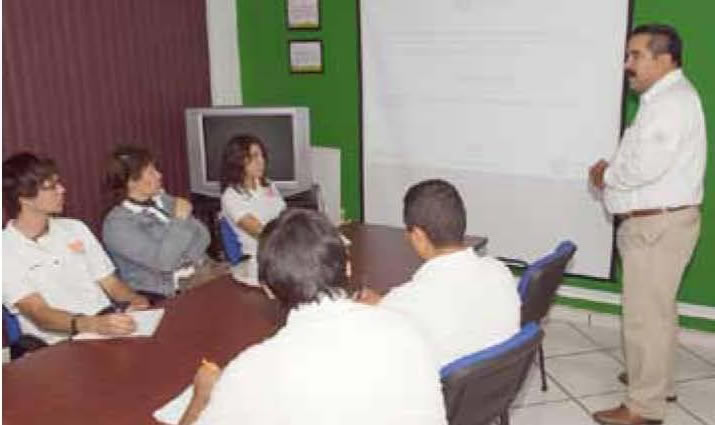 Members of the Grassroots Journalism Network, Sawa, visited the PASA facilities and met with Sergio Moreno. Moreno described the services offered by the company.
Members of the Grassroots Journalism Network, Sawa, visited the PASA facilities and met with Sergio Moreno. Moreno described the services offered by the company.
(Photos: Ernesto Bolado Martínez) Mahi-Mahi
Just for sportfishing?
Big Challenges Met
with Small Actions
By Eunice Angélica Jiménez Cobos*
The sea was calm and as the sun went down, the sky began to change, taking on the warm colors of a typical sunset over the port of Guaymas.
Fireworks, games, painting exhibits, dance and music could be found in the streets throughout the city, in celebration of the battle that occurred more 100 years ago when the port was defended against pirates.
Suddenly something captured the attention of the men and women of Guaymas: a shout was heard from behind the cathedral of San Fernando right in the very center of the port. It was Don Pancho “El Tata” entering the stage. Full of joy, he went on to tell the story of why that day was so special.
Next, Ecomar’s puppet theatre troupe began a live show. They brought with them such characters as Don Pancho, Lili, Anita, Paquito, Conchión, and a group of animals emblematic of the Gulf of California region.
With their performance, the group gave new meaning to the battle for the Guaymas coast. They highlighted the fight for the defense of traditional activities that shouldn’t be allowed to disappear, for the flora and fauna of the region, for endemic and threatened species and above all, for the coastline of the Sea of Cortez.
The puppet theater is one of the environmental organization’s principal activities. Born in the halls of CETMar No. 3 (School
hazardous waste, sewage treatment plants and ship dismanteling factories.
Among its environmental recom-
mendations, PASA highlights the simple things that one can do to personally care for the environment, such as making sure that faucets are completely closed, taking advantage of solar energy instead of using up fossil fuels, separating trash and avoiding the burning of waste.
In terms of dealing with the solid waste generated by the residents of Guaymas, at the PASA installations different colored containers can be seen that are used for the different types of garbage. This helps to process the waste and is part of a program of garbage separation in the schools.
According to Sergio Moreno, manager of PASA, what also stands out are a few PASA trucks that collect these materials as
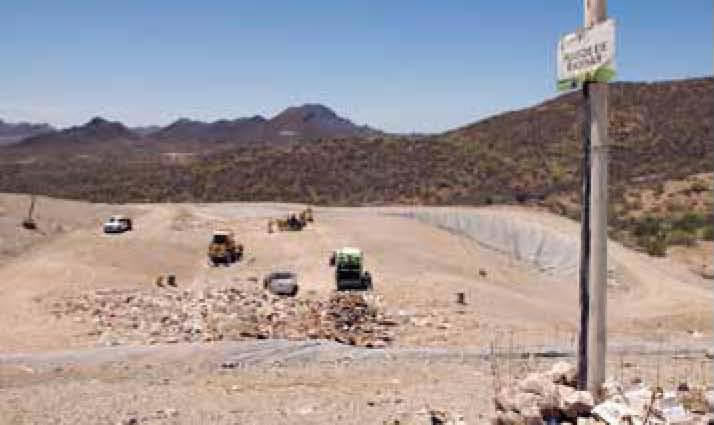 Each unit of the sanitary landfill captures methane gas generated during the decomposition process. The gas can be captured and used for domestic and industrial needs.
Each unit of the sanitary landfill captures methane gas generated during the decomposition process. The gas can be captured and used for domestic and industrial needs. Defenders of the Port
Take on Safeguarding Nature
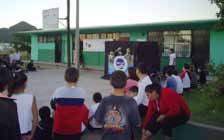 The puppeteers also give performances in the schools as part of their environmental education program.
The puppeteers also give performances in the schools as part of their environmental education program.
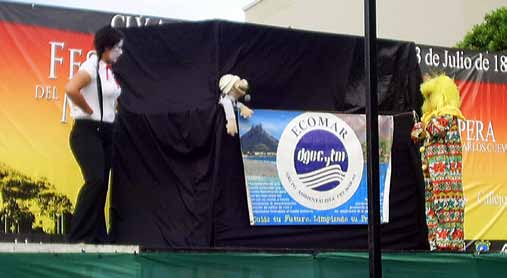 Ecomar's puppet troupe performs at the Vermillion Sea Festival in Heroic Guaymas in July. (Photo: Alba Reyna González, Ecomar)
Ecomar's puppet troupe performs at the Vermillion Sea Festival in Heroic Guaymas in July. (Photo: Alba Reyna González, Ecomar)
well as an ancient cart, an artifact from a former era.
The sanitary landfill is located in the outskirts of Guaymas. It has huge mountains of waste and a terrible odor, in spite of chemicals used to decrease the stench.
The landfill receives 12 trucks of garbage every day. From this quantity, it is easy to understand the importance of compacting the tons of garbage, one ton per square meter. The landfill is divided into cells and levels, each covered with a layer of impermeable plastic to decrease problems with groundwater contamination and the escape of gases.
The cells are shaped like pyramids and will finally stop growing taller after 15 years. They are now 3 years old.
In order to reduce greenhouse gas emissions and support the UN’s Kyoto Protocol, PASA is taking simple steps that nonetheless will lead to a calculated savings of 3 tons of the greenhouse gas carbon dioxide (CO2).
For example, PASA’s internal policy requires that the company’s vehicles must be turned off when not actually being driven, rather than left idling. Additionally, with an electronic billing system for their clients, they hope to decrease paper use by 34,000 pages per month; this is the equivalent of 2.5 trees and will also contribute to the reduction in global climate change.
*Student, COBACH Preparatory School
for Marine Technology Studies), the puppeteers’ main objective is helping to raise the public’s environmental aware-
ness.
Children, teens, adults and grandparents who watched these young adults and their puppets perform left with this message: “although the battle of July 13 was won, (when the French attacked the port of Guaymas and the port was successfully defended), today we are faced with an even bigger fight: to preserve the region’s natural resources by changing our attitudes.”.
Thanks to efforts like those of Ecomar, the community can have fun, learn, and above all, help to win that battle.
*Student, COBACH Preparatory School
 The prized fish can be found in many fishmarkets as well as on the menus of many restaurants.
The prized fish can be found in many fishmarkets as well as on the menus of many restaurants.


